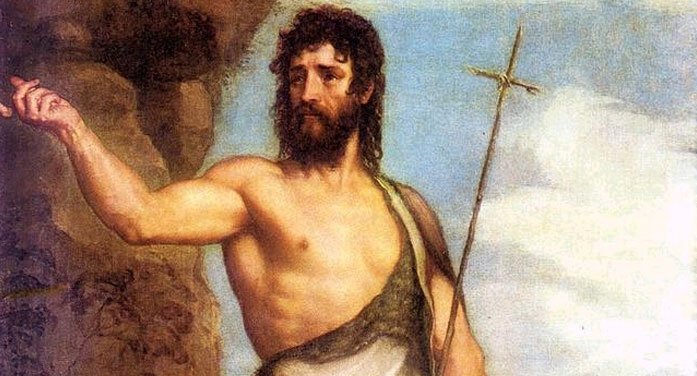The Paradox Par Excellence
Herod was the king of Judea. Then there was a priest named Zechariah. He was of the division Abijah. Elizabeth of the tribe of Aaron, was his wife. Both of them were quite righteous before God. They walked blameless in all the commandments and ordinances of God. But they were not blessed with any children. Both of them were quite advances in age.
It was the chance of Zachariah’s division. He was serving as priest before God. He entered the temple of God to burn incense. People were praying outside. There appeared to Zachariah an angel of the Lord. He was standing on the right side of the altar of incense. Fear fell upon him. But the angel told him: “Do not be afraid Zachariah. Your prayer is heard. Your wife Elizabeth will bear a son. You shall name him John.
You will have joy and gladness. Many will rejoice at his birth. He will be great before the Lord. He shall drink no wine nor strong drink. He will be filled with the Holy Spirit even from his mother’s womb. He will turn many to the Lord their God. He will walk before the Lord in the Spirit and power of Elijah. He will turn the hearts of the fathers to their children. He will convert the disobedient to the wisdom of the just. This is to make ready a people, prepared to accept the Lord.
On account of his doubt, God made him dumb, of course as a sign. When the child was born his mouth was again opened, his tongue loosed, and he spoke, blessing the good God. The neighbours marvelled and asked: “What will this child be?” for the hand of the Lord was with him. The child grew and became strong in Spirit. He was in the wilderness till the day of his manifestation to Israel. John’s father Zachariah was filled with the Holy Spirit. He prophesied: “Praise the Lord, the God of Israel, because he has visited and redeemed his people. He has sent us a mighty saviour from the royal line of his servant David, just as he promised through his holy prophets long ago. Now we will be saved from our enemies and from all who hate us. He has been merciful to our ancestors by remembering his sacred covenant- the covenant he swore with an oath to our ancestor Abraham. We have been rescued from our enemies. So we can serve God without fear, in holiness and righteousness as long as we live. And you, my little son, will be called the prophet of the Most high, because you will prepare the way for the Lord. You will tell his people how to find salvation through forgiveness of their sins. Because of God’s tender mercy, the morning light from heaven is about to break upon us, to give light to those who sit in darkness and in the shadow of death, and to guide us to the path of peace” (Luk.1:68-79).
It was the fifteenth year of Tiberius Caesar. Pontius Pilate was the governor of Judea; Herod the tetrarch of Galilee. His brother Philip was the tetrarch of Ithuria. Trachonitus and Lysanias tetrarch of Abilene. During the high priesthood of Annas Caiaphas, the word of God came to the Baptist (name on account of his role in the economy of salvation as the Baptizer). He went into all the region about Jordan. He was preaching the baptism of repentance for the forgiveness of sin. Prophet Isaiah wrote about him: “He is voice shouting in the wilderness, Prepare the way for the Lord’s coming! Clear the road for him! The valleys will be filled, and the mountains and hills made level. The curves will be straightened, and the rough places made smooth. And then all people will see the salvation sent from God” (Luk. 3:4-6).
Certainly multitudes came out to be baptized. He told them plainly: “you brood of vipers”. When the crowds came to John for baptism, he said, You brood of snakes! Who warned you to flee the coming wrath? Prove by the way you live that you have repented of your sins and turned to God. Don’t just say to each other, we are safe for we are descendants of Abraham. That means nothing, for, I tell you, God can create children of Abraham from these very stones. Even now the axe of God’s judgment is poised, ready to sever the roots of the trees. Yes, every tree that does not produce good fruit will be chopped down and thrown into the fire.
The crowds asked, What should we do? John replied, If you have two shirts, give one to the poor. If you have food, share it with those who are hungry. Even corrupt tax collectors came to be baptized and asked, Teacher, what should we do?
He replied, Collect no more taxes than the government requires.
What should we do? Asked some soldiers.
John replied, Don’t extort money or make false accusations. And be content with your pay.
Everyone was expecting the Messiah to come soon, and they were eager to know whether John might be the Messiah. John answered their questions by saying, “I baptize you with water; but someone is coming soon who is greater than I am- so much greater than I am not even worthy to be his slave and untie the straps of his sandals. He will baptize you with the Holy Spirit and with fire. He is already to separate the chaff from the wheat with his winnowing fork. Then he will clean up the threshing area, gathering the wheat into his barn but burning the chaff with never-ending fire. John used many such warnings as he announced the Good news to the people.
John also publicly criticized Herod Antipas, the ruler of Galilee, for marrying Herodias, his brother’s wife and for many other wrongs he had done. So Herod put John in prison, adding this sin to his many others” (Lk. 3:7-20).Then Jesus returned to Galilee, filled with the Holy Spirit’s power. Reports about him spread quickly through the whole region. He taught regularly in their synagogues and was praised by everyone” (Luk.4:14,15). The words of life Jesus spoke and the miracles He performed were reported to John the Baptist.
This was John’s testimony when the Jewish leaders sent priests and Temple assistants from Jerusalem to ask him, “Who are you?”. He came right out and said, I am not the Messiah? Well then, Who are you, they asked. “Are you Elijah”?
“No”, he replied.
“Are you the Prophet we are expecting?” No
Then who are you? We need an answer for those who sent us. What do you have to say about yourself?
John replied in the words of the prophet Isaiah: I am a voice shouting in the wilderness, Clear the way for the Lord’s coming. Then the Pharisees who had been sent asked him, If you are not the Messiah or Elijah or the Prophet, what right do you have to baptize?
John told them, I baptize with water but right here in the crowd is someone you do not recognize. Though his ministry follows mine, I am not even worthy to be his slave and untie the straps of his sandal. This encounter took place in Bethany, an area east of the River Jordan, where John was baptizing” (Jn. 1: 19-28).
“Then Jesus and his disciples left Jerusalem and went into the Judean countryside. Jesus spent some time with them there, baptizing people. At this time John the Baptist was baptizing at Aenon, near Salim, because there was plenty of water there; and people kept coming to him for baptism. A debate broke out between John’s disciples and a certain Jew over ceremonial cleansing. So John’s disciples came to him and said, Rabbi, the man you met on the other side of the River Jordan, the one you identified as the Messiah, is also baptizing people. And everybody is going to him instead of coming to us. John replied, No one can receive anything unless God gives it from heaven. You yourselves know how plainly I told you, I am not the Messiah. I am only here to prepare the way for him. It is the bridegroom who marries the bride, and the bridegroom’s friend is simply glad to stand with him and hear his vows. Therefore, I am filled with joy at his success” (Jn. 3:22-29). “The disciples of John the Baptist told John about everything Jesus was doing. So John called for two of his disciples and he sent them to the Lord to ask him, Are you the Messiah we have been expecting, or should we keep looking for someone else?
John’s two disciples found Jesus and said to him, John the Baptist sent us to ask, Are you the Messiah we have been expecting or should we keep looking for someone else?”
At that very time, Jesus cured many people of their diseases, illness, and evils spirits and he restored sight to many who were blind. Then he told John’s disciples, “Go back to John and tell him what you have seen and heard-the blind see, the lame walk, those with leprosy are cured, the deaf hear, the dead are raised to life, and the Good news is being preached to the poor. And he added, “God blesses those who do not fall away because of me”.
After John’s disciples left, Jesus began talking about him to the crowds. What kind of man did you go into the wilderness to see? Was he a weak reed swayed by every breath of wind? Or were you expecting to see a man dressed in expensive clothes? No, people who wear beautiful clothes and live in luxury are found in palaces. Were you looking for a prophet? Yes, and he is more than a prophet. John is the man to whom the Scriptures refer when they say, Look, I am sending my messenger ahead of you, and he will prepare your way before you. I tell you, of all who have ever lived, none is greater than John. Yet even the least person in the Kingdom of God is greater than he is.
When they heard this, all the people-even the tax collectors- agreed that God’s way was right, for they had been baptized by John. But the Pharisees and experts in religious law rejected God’s plan for them, for they had refused John’s baptism. For John the Baptist didn’t spend his time eating bread or drinking wine, and you say, He is possessed by a demon. The Son of Man on the other hand, feasts and drinks, and you say, He is a glutton and a drunkard, and a friend of tax collectors and other sinners. But Wisdom is shown to be right by the lives of those who follow it” (Luk. 7:18-35).
John the Baptist was in prison quite for some time. At a birthday party for Herod, Herodias’s daughter performed a dance that greatly pleased him, so he promised with a vow to give her anything she wanted. At her mother’s urging, the girl said, “I want the head of John the Baptist on a tray!” Then the king regretted what he said; but because of the vow he had made in front of his guests, he issued the necessary orders. So John was beheaded in the prison, and his head was brought on a tray and given to the girl, who took it to her mother. Later, John’s disciples came for his body and buried it. Then they went and told Jesus what had happened” (Jn. 14: 1-12).


